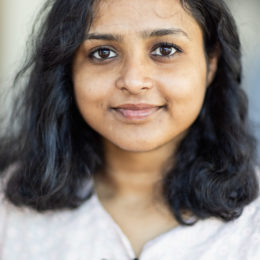In this project, our main goal is to study two problems of operator theory and harmonic analysis namely reducing subspace problem for proper holomorphic multipliers (which are factored by automorphisms) and Lp regularity of Szeg¨o and Bergman projections and other singular integral operators on the quotient domains using tools from the representation theory and invariant theory of G.
Gargi Ghosh
Let Ω and Ὡ be two domains in Cn related by a proper holomorphic map f = (f1, . . . , fn) : Ω → Ὡ which is factored by automorphisms G ⊆ Aut(Ω). It is known that G is either a finite pseudoreflection group or conjugate to a finite pseudoreflection group. Moreover, eΩ is biholomorphically equivalent to the quotient domain Ω/G and hence to θ(Ω), where θ is a basic polynomial map associated to the group G. In this project, our main goal is to study two problems of operator theory and harmonic analysis namely reducing subspace problem for proper holomorphic multipliers (which are factored by automorphisms) and Lp regularity of Szegö and Bergman projections and other singular integral operators on the quotient domains using tools from the representation theory and invariant theory of G.
0.1. Classification of irreducible joint reducing subspaces of proper holomorphic multipliers. The problem of understanding the nature of joint reducing subspaces of proper holomorphic multipliers and parametrizing the number of minimal joint reducing subspaces by a topological invariant (for example, the number of connected components of some Riemann surface) has been studied extensively in the literature for one and several variables. On the Hardy space of the unit disc D in the complex plane C, for the multiplication operator by a finite Blaschke product (the class of all proper holomorphic self-maps of D) the aforementioned problem was studied by Cowen–Thomson during 1976-78. Analogous problem was investigated in the context of the Bergman space A2(D) of the unit disc D rather recently by Douglas, Guo, Huang, Putinar, Wang, Zhu and many others. Various attempts have been made to generalize this result in several variables by Huang–Ling, Biswas–Datta–Ghosh–Shaym Roy. Let H be an analytic Hilbert module on the domain Ω ⊆ Cn over the polynomial ring C[z1, . . . , zn]. In this project, we aim to identify all irreducible joint reducing subspaces of the n-tuple multiplication operators Mf = (Mf1 , . . . ,Mfn) on H and index them by some algebraic invariant using representation theory of G. Since the proper holomorphic map θ is a representative for f, we work with the n-tuple of operators Mθ on H in our project which enables us to use various results from invariant theory of G.
0.2. Lp regularity of Szegö and Bergman projection. The study of the boundedness of the integral operators on weighted Lp spaces is commonly observed in harmonic analysis and operator theory. The history of it goes back to the fundamental works of Stein, Muckenhoupt, Coifman–Fefferman and others. Since then Lp regularity for certain operators has always been of immense interest in several areas of analysis pertaining to the theory of differentiation, embedding theorems, regularity of solutions of partial differential operators etc. For example, we recall the following work of Astala– Iwaniec–Saksman where the authors have studied the connections between the quasi regularity of solutions of Beltrami equation with the sharp operator norm estimate of the Ahlfors–Beurling transform. Lanzani–Stein have investigated the link between of the Cauchy integral and the regularity of Dirichlet problem (homogenous and inhomogeneous) for non-smooth simply connected domains in C. In the process, they have determined the range for p where the Szegö projection and the Bergman projection are bounded for certain classes of domains which are conformally connected to the unit disc D. In this project, we explore the Lp regularity of (weighted) Szegö and Bergman projection of domains in the form θ(Ω) to investigate various geometric properties of such domains. Later, we aim to determine sharp range of p such that the Szegö projection of ∂θ(Ω) and the Bergman projection of θ(Ω) are bounded on the weighted Lp spaces for some particular families of weights such as Bekolle–Bonami type weight functions, Muckenhoupt type weight functions etc. which will be a starting point to develop appropriate qualitative and quantitative weighted estimates on these domains.
Project details
Project title:Pseudoreflection groups in Operator theory and Harmonic analysis
Principal Investigator: dr Gargi Ghosh
Host institution: Jagiellonian University in Cracow
Project’s website: https://sites.google.com/view/protha-polonezbis2/home

